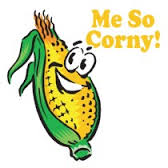corny
英 [ˈkɔː.ni]
美 [ˈkɔːr.ni]
- adj. 谷类的;粗野的;陈腐的;乡下味的
- n. (Corny)人名;(法)科尔尼;(英)科尼(男子教名Connor、Cornelius 的昵称)
星级词汇:

记忆方法
记忆“corny”的一个简单方法是将它分解为“corn”和“-y”。将“corn”想象成玉米,它是简单、常见的,而“-y”通常用来形容某事物带有某种特质。所以,将这两个部分结合起来,你可以想象玉米是简单到有点过时或者老套的,从而记住“corny”这个单词意味着“陈腐的”、“老套的”或“乡气的”。
以上内容由AI生成, 仅供参考和借鉴
中文词源
corny 老生常谈的
来自corn, 谷物。俚语词,即种田的人谈的,乡巴佬的。
英语词源
- corny (adj.)
- 1570s, "full of corn, pertaining to corn, from corn (n.1) + -y (2). Chaucer used it of ale (late 14c.), perhaps to mean "malty." American English slang "old-fashioned, sentimental" is from 1932 (first attested in "Melody Maker"), perhaps originally "something appealing to country folk" (corn-fed in the same sense is attested from 1929). Related: Cornily; corniness.
权威例句
- 1. I know it sounds corny, but I'm really not motivated by money.
- 我知道这听起来像是老生常谈,但我真的不是为了钱。
- 2. The dialogue and acting in Indecent Proposal are tired, cliched and corny.
- 《桃色交易》中的对白和表演尽落俗套,毫无新意。
- 3. He has an endless supply of corny jokes.
- 他有说不完的老掉牙的笑话.
- 4. The movie was just so corny that I had to leave before it finished.
- 这部电影太老土了我不得不在电影没放完之前离开。
- 5. The boss gets too corny when he talks to the workers.
- 老板每次跟员工说话都是陈腔滥调.